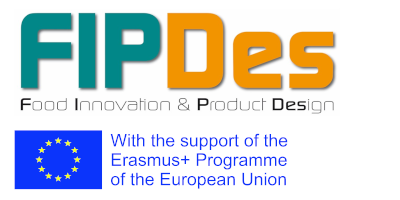FIPDes Day 2014
International Talents in Food Innovation and Product Design:
From concepts to consumption
Thursday 4th September, 2014

FIPDes Day 2014 was held at the Amphitheatre 7 at the premises of AgroParisTech, Avenue du Maine in Paris, France. Barbara Rega, the FIPDes coordinator, held the welcoming speech. She also opened the first session called Product and Process Engineering towards Sustainable Food Design. The first keynote speaker, Camille Michon from AgroParisTech, presented the most resent research on yogurt microgels, and their different sensory properties. It was shown that microgels shape can be detected more accurate with sensory measurements than with instrumental characterization.

Creating sustainable applications for food and feed from insects was the title of the second and very exciting keynote speech by Antoine Hubert from Ynsect. Ynsect is the biotech company specialized in bioconversion of organic resources by insects, and their processing into nutrients for food and feed, and for other applications. Mr. Hubert showed how insects could be a part of a sustainable solution for a growing population, for example by having a much higher bioconversion rate than animals and with practically no food waste. Obstacles still are the cultural barriers, especially in Europe, lack of trust and limits by regulation. Students presenting their master’s theses were: Hela Ferchichi, Anna Kharlamova, Anna Radawska, Elham S. Tehrani and Julia Schoppe.

How can you make a biscuit healthier and how do you show it? Those were questions addressed by Sophie Vinoy, the first keynote speaker in the second session called Healthy and sustainable food innovation: a natural match. Her speech, Health cereal foods: from concept to products, showed how important it is to balance nutritional composition, consumer interest, research, marketing and regulations when developing healthier food products. The audience learned that research projects aiming at showing a health effect of food is always a long-term commitment, which typically last 4-6 years. She exemplified with the recent food trend of wanting a slow release of carbohydrates for a moderate glycemic response. To be able to show it, nutrition research of today uses stable isotope labelling of flour to measure the glucose appearance rate. However, Sophie Vinoy reminded everyone that in the end, the consumer always gives the final verdict: if the product is tasty or not.

As in 2013, also this year’s FIPDes Day welcomed Anita Linnemann from Wageningen University as a speaker. This time her focus was on the multi-faceted area of Sustainability in the food chain. In her speech, she gave striking examples on how difficult it can be to interpret the Brundtland commission’s definition of sustainability: whose needs are we talking about in the present and forthcoming generations, a wealthy family in Germany, or their counterpart in Mali? She also highlighted myths that make matters worse, such as “packaging is always bad”. She ended her talk by emphasizing the need to distinguish between our actions as consumers, with focus on short-term egocentric matters, and as concerned citizens, in which we tend to pay more attention to social and long-term sustainable issues. Master’s theses were presented by Aissa Caintic, Badiaa Boulila, Iliana Yanez, Methap Tekin, Sewuese Okubanjo and Sofia Yasky.


The second half of the FIPDes Day kick-started with Sofia Ehlde’s keynote The Power of Swedish liquid oats – The Oatly story. It was a great example of the session called Glocal innovation in food packaging design. Oatly’s Sofia Ehlde showed the audience the fascinating trip from being a food processing company to a lifestyle brand, with focus on the strong growing group of people adapted to LOHAS – Lifestyle of Health and Sustainability. Strongly committed to making changes easy for people, the company has released several vegan alternatives to milk, and has even a plug in for browsers – the Oatlyfier – for replacing milk with its oat-based alternatives in on-line recipes. Students presenting their theses in this session were Yessica Dwi Ariesta, Mustafa Bombaywala, Mena Hanna and Zyra Mae Oliman.

The fourth and last session of the FIPDes Day 2014 was Food innovation and product design: From concepts to consumption. Two keynote speakers gave examples on the huge width of this topic. Laure Morel from Lorraine Fab Living Lab showed how to accelerate the passage from idea to materialization. In her speech, Go quickly from idea to prototype, she explained how the use of advanced technical equipment such as 3D-printers, scanners and eye-tracking modules can aid new product development. The second speech, on the other hand, had the focus on the bottom of the pyramid, the 50 % of the world’s population not likely to have access to the latest technology. The keynote speaker, Ivan Le Mintier, focused his talk Introducing BoP and frugal innovation: how to innovate differently to serve the unserved as an entrepreneur on how to give more for less by frugal innovation. He exemplified with the Q-drum, a new way of transporting water in developing countries. The fourth session closed with the colourful presentation of second semester student’s food prototypes done within the module Food Prototype Development and Evaluation in Dublin. Presenters were Francisco Arevalo, Daniela Freitas and Sarabjit Kaur.

The FIPDes day ended with the announcement of the winner of the student poster competition, which was Yessica Dwi Ariesta from Indonesia. Barbara Rega officially closed the day by citing comments put up on the FIPDes tree, the poster for feedback on the programme:
- The FIPDes dream should be to create healthy food and to contribute to less hunger in the world.
- The expectations of the programme are to make good friends and to have interesting studies.
- The output is that cooperation between countries creates more opportunities to innovate!
Click on the picture to see the next picture
Pictures and text by Erik Andersson
(update september 2014)
- Updated February 2015 -






















